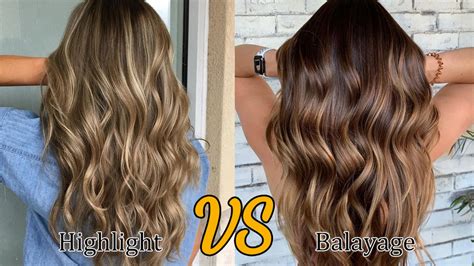Introduction
In the realm of hair artistry, two techniques reign supreme: balayage and highlights. While both methods create stunning results, they differ significantly in their approaches and outcomes. This comprehensive article will delve into the intricacies of balayage vs. highlights, providing a side-by-side comparison to guide you in making the perfect choice for your hair goals.

Key Differences
| Feature | Balayage | Highlights |
|---|---|---|
| Application Technique | Freehand painting | Foil separation |
| Placement | Starts at the mid-lengths and ends | Regular intervals from root to tip |
| Blending | Gradual, natural-looking streaks | Distinct, more defined lines |
| Effect | Sun-kissed, dimensional hair | Brighter, more noticeable highlights |
| Color Selection | Multiple shades, blended seamlessly | Single shade, repeated consistently |
| Maintenance | Low maintenance, grows out subtly | Requires regular touch-ups |
Balayage: The Free-Form Masterpiece
Balayage, meaning “to sweep” in French, is an elegant hand-painted technique that mimics the natural effects of sun-kissed hair. By applying color freehand, stylists create subtle, graduated streaks that blend seamlessly with the base color.
Advantages:
- Natural-looking, low-maintenance results
- Adds depth and dimension to hair
- Suitable for all hair types
- Can be customized to create unique looks
Highlights: Precision and Definition
Highlights, on the other hand, involve the use of foils or caps to isolate strands of hair for color application. This method results in more defined, regular streaks that stand out against the base color.
Advantages:
- Noticeable, brighter highlights
- Can be used to create dramatic color changes
- Suitable for fine to medium hair textures
- Offers a wide range of color options
Choosing the Right Technique
The best choice between balayage and highlights depends on your hair goals, lifestyle, and hair type. If you desire natural-looking, low-maintenance hair with subtle dimension, balayage is an excellent option. However, if you prefer more defined, noticeable highlights, highlights may be the better choice.
Consider the following factors:
- Your Current Hair Color: Darker hair requires stronger highlights to be visible, while lighter hair may be more suited for balayage.
- Hair Texture: Balayage is generally more suitable for fine to medium hair textures, while highlights can be used on all hair types.
- Maintenance Requirements: Balayage grows out more subtly and requires less touch-ups compared to highlights.
- Time and Cost: Balayage is typically more time-consuming and expensive than highlights.
Common Mistakes to Avoid
- Over-Processing: Excessive chemical processing can damage hair and lead to breakage.
- Incorrect Color Selection: Choosing colors that are too similar or too different from the base color can result in unnatural-looking results.
- Improper Application: Uneven or messy application can create unflattering streaks.
- Lack of Maintenance: Regular touch-ups are crucial for maintaining the desired look of highlights.
Frequently Asked Questions (FAQs)
Q1: Which technique is more versatile?
A1: Balayage offers greater versatility due to its freehand application, allowing for a wider range of customization.
Q2: Which technique is more damaging?
A2: Both techniques require some level of chemical processing, but balayage is generally less damaging due to its targeted application and reduced amount of foils.
Q3: How often should I get my hair highlighted or balayaged?
A3: The frequency depends on the desired effect and hair growth rate. Highlights typically require more frequent touch-ups (every 6-8 weeks) compared to balayage (every 12-16 weeks).
Q4: Can I get balayage and highlights together?
A4: Yes, combining balayage and highlights can create a unique, multi-dimensional look. However, it is crucial to consult with a skilled stylist to ensure a harmonious blend of techniques.
Conclusion
Balayage and highlights are two transformative techniques that cater to different hair goals and lifestyles. Whether you seek subtle, sun-kissed locks or bold, eye-catching highlights, there is a technique that can elevate your hair to its fullest potential. By understanding the key differences and consulting with a professional stylist, you can make an informed decision and embrace the beauty of both balayage and highlights.
